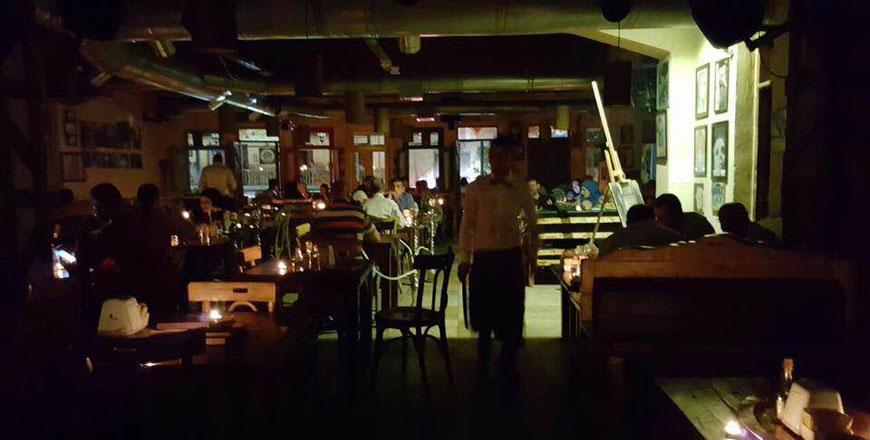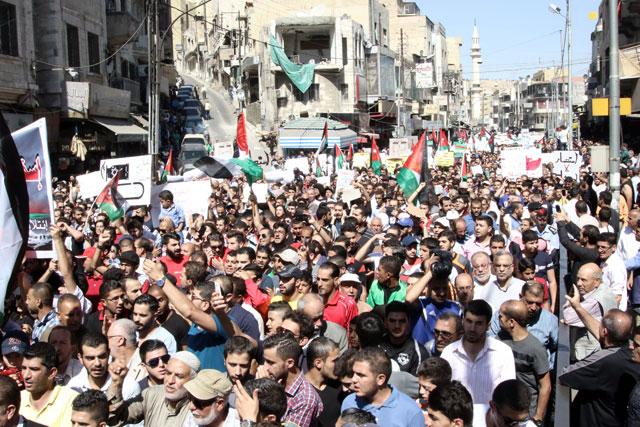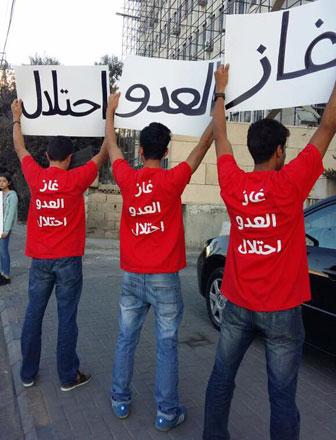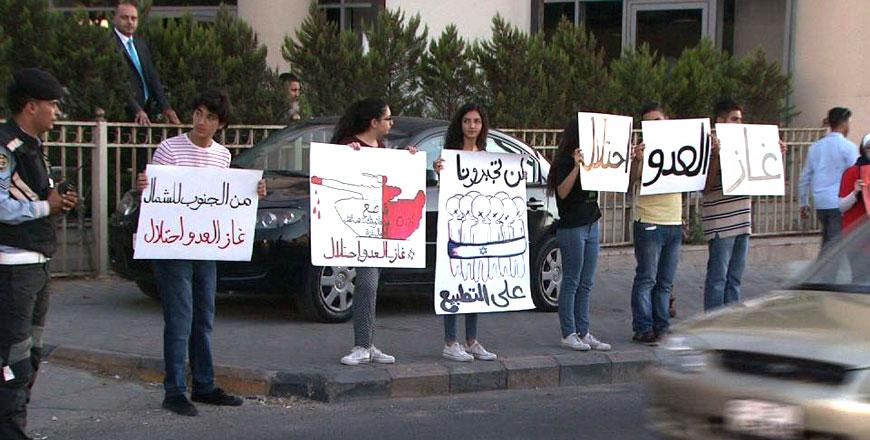You are here
Across Jordan, lights go out to protest gas deal with Israel
By Suzanna Goussous - Oct 03,2016 - Last updated at Oct 03,2016

Lights are turned off at a café in Amman on Sunday night to protest the gas deal with Israel (Photo courtesy of Boycott, Divestment and Sanctions movement)
AMMAN — Activists and residents across the Kingdom turned their lights off for an hour on Sunday night to protest the gas deal between Jordan’s National Electric Power Company (NEPCO) and Israel.
Under the slogan “The enemy’s gas is occupation”, the initiative aimed to show the public’s rejection of the gas deal, which was signed last week, as homes across Jordan switched off electrical appliances at 9pm.
Amman resident Samah Bibars, a mother of two, said the initiative not only symbolised the public’s rejection of the deal, it also helped parents convey the message to their children.
“I explained to my children the importance of boycotting and voicing our rejection of the gas deal with the Zionists. It was important to introduce them to the concept,” she said.
Bibars added: “We were all protesting the gas deal under one notion. It was a peaceful act to protest.”
Foodstuff Traders Association President Khalil Haj Tawfiq, who also took part in the initiative, said he was impressed by the level of awareness among the younger generation.
“The awareness of political events and conditions is high among school and university students; they were all united for the same cause. A cause they are completely convinced of,” he told The Jordan Times.
Haj Tawfiq, a father of two, said the idea was promoted by activists and campaigners mostly from the younger generation who expressed their outrage over the agreement.
“The initiative reflects the civilised way Jordanians protest a decision they do not agree with and do not want to be part of. This way sends a clear message to the government and shows the public’s response to the gas deal,” he added.
Mohammad Mahadeen, from Karak Governorate some 130km south of Amman, said activists and civil society organisations turned off their lights at 9pm “in solidarity with the Palestinians”.
“Our martyr Saeed Amro was murdered by the occupation forces in Jerusalem recently. It is a disgrace for us as Jordanians and residents of the south to accept the gas deal, this [initiative] will generate many other activities,” he added.
Activist Malek Sabe from the Boycott, Divestment and Sanctions movement in the northeastern governorate of Mafraq said residents who participated in the march on Friday to denounce the deal also took part in the initiative.
Around 40 per cent of the houses in the governorate turned off their lights, he said, adding that activists would take other measures to raise awareness of the issue during the upcoming days.
University student Haneen Saadi said the initiative helps to show the state-owned company that Jordanians oppose the newly-signed deal.
“I think we are all for the same cause. This is a serious issue that we all need to stay united for and alert people to its consequences.”
Several restaurants and coffee shops in the capital, Irbid, Karak, Balqa and other governorates participated in the initiative, switching off their lights to show their rejection of the deal.
Officials from NEPCO have said that the deal with US Noble Energy to import natural gas would “help save Jordan up to $600 million each year”.
Noble Energy is a Houston-based company that holds the largest share in the Israeli Leviathan gas field, located in the Mediterranean Sea off the coast of Israel.
A NEPCO official said the deal will enable Jordan to import 300 million cubic feet of gas per day, which represents 40 per cent of the Kingdom’s electricity-generating.
In remarks on Sunday to Jordan Television’s “Jordan this Evening” programme, Government Spokesperson Mohammad Momani said it is “extremely shallow” to suggest that Jordan supports the Israeli occupation by signing the gas deal, stressing the Kingdom’s "undisputed stance" towards the occupation.
“We are the one country most capable of confronting this occupation,” he noted, stressing, however, the need to “put matters in perspective”, since Jordan has signed a peace deal with Israel in 1994 and is engaged in trade with it.
The deal is a “strategic choice” based on diversifying energy resources; however, it does not put Jordan at Israel’s mercy “as some speculators suggest”, the spokesperson noted.
The government announced the deal two years ago and explained all of the justifications in “total transparency”, he added.
Related Articles
AMMAN — Activists across the Kingdom have organised protests and marches to demand the cancellation of the recent gas deal between Jordan’s
AMMAN — Activists on Tuesday called on Jordanians to turn off their lights for one hour on Sunday to protest the recent gas deal between Jor
AMMAN — Seeking to reach a wider audience, activists in Jordan are using art in creative peaceful protests to convey their rejection of the

















